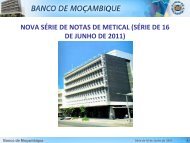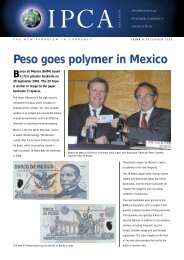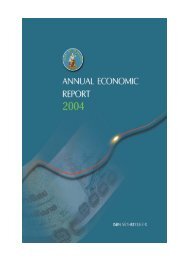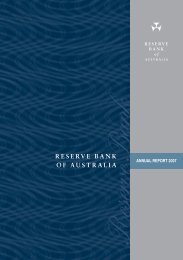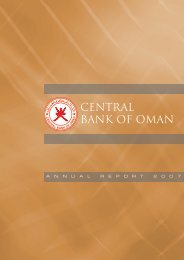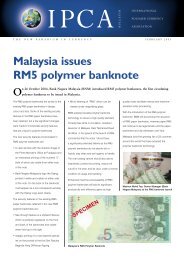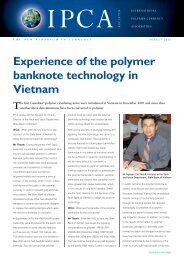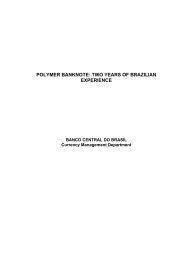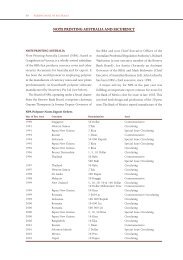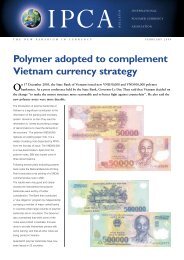ANNUAL REPORT 2008 - Polymer Bank Notes of the World
ANNUAL REPORT 2008 - Polymer Bank Notes of the World
ANNUAL REPORT 2008 - Polymer Bank Notes of the World
You also want an ePaper? Increase the reach of your titles
YUMPU automatically turns print PDFs into web optimized ePapers that Google loves.
for <strong>the</strong>ir current position. On <strong>the</strong> o<strong>the</strong>r hand,staff have to take <strong>the</strong> necessary steps for learningand development and ensure that <strong>the</strong>ir expertiseis maintained at <strong>the</strong> highest level. In additionto numerous in-house training opportunities,staff continued to take up external trainingopportunities to address individual trainingneeds <strong>of</strong> a more “technical” nature. They alsobenefited from training opportunities organisedas part <strong>of</strong> ESCB programmes or <strong>of</strong>fered by<strong>the</strong> NCBs.In <strong>the</strong> context <strong>of</strong> its secondary training policy,<strong>the</strong> ECB provided 12 members <strong>of</strong> staff withsupport to acquire a qualification that wouldincrease <strong>the</strong>ir pr<strong>of</strong>essional competence beyond<strong>the</strong> requirements <strong>of</strong> <strong>the</strong>ir current position.RECRUITMENTAt <strong>the</strong> end <strong>of</strong> <strong>2008</strong> <strong>the</strong> actual full-time equivalentnumber <strong>of</strong> staff holding contracts with <strong>the</strong> ECBwas 1,536 19 (compared with 1,478 at <strong>the</strong> end<strong>of</strong> 2007).External recruitment to fill permanent positionswas carried out on <strong>the</strong> basis <strong>of</strong> fixed-termcontracts <strong>of</strong> five years for managerial positionsand three years for o<strong>the</strong>r positions, whichmay be converted into unlimited contracts,subject to organisational considerations andindividual performance. Fixed-term contractsmay also be issued to replace permanent staffwho are temporarily absent for periods <strong>of</strong>more than 12 months, for instance in cases <strong>of</strong>parental or unpaid leave. In <strong>2008</strong> <strong>the</strong> ECB<strong>of</strong>fered a total <strong>of</strong> 108 fixed-term contracts. Bycontrast, 45 members <strong>of</strong> staff with fixed-termor permanent contracts left <strong>the</strong> ECB in <strong>2008</strong>.Fur<strong>the</strong>rmore, 113 short-term contracts wereissued during <strong>2008</strong> (in addition to some contractextensions from 2007) to cover for absences <strong>of</strong>less than one year, while 83 short-term contractsexpired in <strong>the</strong> course <strong>of</strong> <strong>the</strong> year.The ECB also <strong>of</strong>fers short-term contractsto staff from NCBs and internationalorganisations, thus allowing <strong>the</strong> ECB and<strong>the</strong>se organisations to gain from each o<strong>the</strong>r’sexperience. Employing NCB staff on ashort-term basis also helps to foster anESCB-wide team spirit. On 31 December <strong>2008</strong>122 employees from NCBs and internationalorganisations were working at <strong>the</strong> ECB onvarious assignments (compared with 91 on31 December 2007).In September <strong>2008</strong> <strong>the</strong> third intake <strong>of</strong>participants in <strong>the</strong> ECB’s Graduate Programme,which is aimed at recent graduates with a broadeducational background, joined <strong>the</strong> <strong>Bank</strong> on<strong>the</strong> basis <strong>of</strong> two-year non-convertible contracts.The first generation <strong>of</strong> participants completed<strong>the</strong> Graduate Programme in <strong>2008</strong>, and a largenumber <strong>of</strong> <strong>the</strong>m successfully applied forconvertible fixed-term positions at <strong>the</strong> ECB.The internship opportunities <strong>of</strong>fered by <strong>the</strong>ECB focused on students and graduates withbackgrounds in economics, statistics, businessadministration, law and translation. On31 December <strong>2008</strong> 84 interns were being hostedby <strong>the</strong> ECB.The ECB also <strong>of</strong>fered two fellowships as part<strong>of</strong> <strong>the</strong> Wim Duisenberg Research FellowshipProgramme, which is open to leadingeconomists, and five fellowships to youngresearchers in <strong>the</strong> context <strong>of</strong> its LamfalussyFellowship Programme.EMPLOYMENT CONDITIONSTaking into account <strong>the</strong> most recentdevelopments regarding life expectancyand long-term financing, <strong>the</strong> ECB has beenconducting a review <strong>of</strong> <strong>the</strong> retirement plan it<strong>of</strong>fers to its staff. The results <strong>of</strong> this review areexpected to be implemented in early 2009.In <strong>2008</strong> <strong>the</strong> ECB also started a review <strong>of</strong> itsdisciplinary and appeals procedures. Thechanges introduced were aimed at increasing <strong>the</strong>effectiveness and efficiency <strong>of</strong> both procedureswhile preserving <strong>the</strong> rights granted to members<strong>of</strong> staff.19 Staff on unpaid leave <strong>of</strong> absence are excluded. This numberincludes staff with permanent, fixed or short-term contracts and<strong>the</strong> participants in <strong>the</strong> ECB’s Graduate Programme. Staff onmaternity or long-term sick leave are also included.208 ECBAnnual Report<strong>2008</strong>



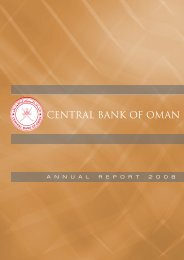
![KNOW YOUR NEW GIBRALTAR BANKNOTES - [Home] bThe/b](https://img.yumpu.com/50890985/1/184x260/know-your-new-gibraltar-banknotes-home-bthe-b.jpg?quality=85)
![PAPUA NEW GUINEA - [Home] - Polymer Bank Notes of the World](https://img.yumpu.com/49758743/1/190x143/papua-new-guinea-home-polymer-bank-notes-of-the-world.jpg?quality=85)

